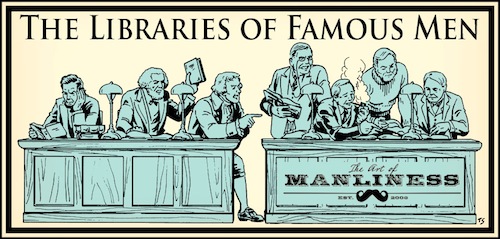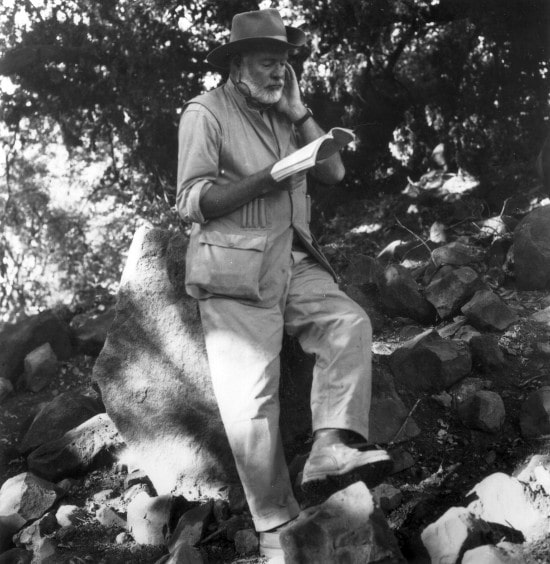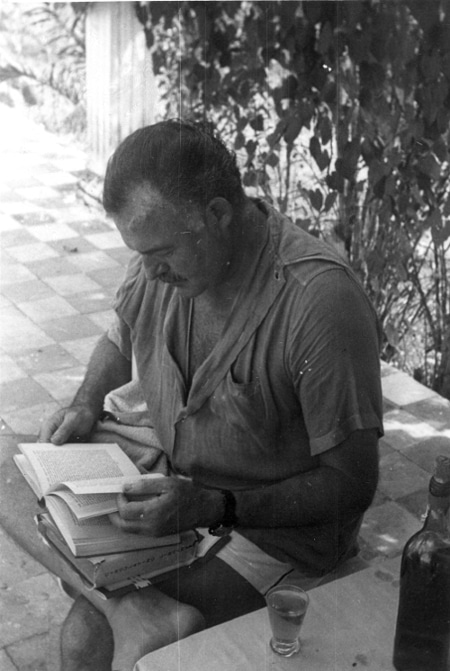
Welcome back to our series on the libraries of great men. The eminent men of history were often voracious readers and their own philosophy represents a distillation of all the great works they fed into their minds. This series seeks to trace the stream of their thinking back to the source. For, as David Leach, a now retired business executive put it: “Don’t follow your mentors; follow your mentors’ mentors.â€
Ernest Hemingway is well known as one of the best and most virile writers of his era, and perhaps of all time. He wrote 10 novels, 9 non-fiction works, and multiple collections of short stories, poetry, and essays. They range in scope from fictional war stories and fishing tales, to real-life hunting trips and romantic Paris living. His iconic writing style inspires manliness, and in my experience, even those who don’t necessarily enjoy reading consume his works with pleasure and ease.
What may not be so well known about Papa Hemingway was his own voracious reading appetite. He once said, “I’m always reading books — as many as there are.†And others noted this habit of his as well: “He was always reading. When he wasn’t working he was reading,†“He read all the time,†and “I think Ernest read just about everything. He was a terrific reader.†He was known to always be reading about four books at a time, which occasionally ballooned to even eight or ten. He also subscribed to numerous periodicals, be it magazines or newspapers, and consumed them with equal vigor. The written word was truly his passion and life’s work.

In Hemingway’s case, his reading habits weren’t picked up out of a lack of education, as they are for many great men like Frederick Douglass or Louis L’Amour. He grew up in a family where reading was incredibly important, and credits the library in his childhood home with instilling a lifelong love of the activity in both him and his siblings. His sister Marcelline once wrote:
“Ernest and I did a lot of reading. Sets of the classics, Scott, Dickens, Thackeray, Stevenson and Shakespeare filled many of the shelves in our family library. I don’t think we skipped any of them. Only the fact that I was out of school with mumps one spring and had run out of all other reading matter provided time for me to read all the tragedies of Shakespeare as well as rereading the comedies. Ernie’s attack of mumps followed mine, and I know the same volumes were available to him. We both devoured Stevenson, especially one of his lesser known volumes, The Suicide Club, as well as Treasure Island. Thackeray wasn’t as easy reading as Kipling or Stevenson or Dickens, but the green cloth volume of Vanity Fair we read from cover to cover. We both read Horatio Alger books in third and fourth grade, and Ernest took them seriously.”

As Hemingway aged, his love of reading only deepened. For most of his life he read about a book and a half per day, as well as at least three daily newspapers. And this didn’t change when he traveled; he was known to bring an entire duffel bag of books with him on any trip he took. Reading was not an afterthought for him, but was in fact a non-negotiable part of his daily ritual. Generally, Hemingway would write in the morning, working until about lunchtime, and then spend large chunks of the afternoon and evening reading.
Beyond just for pleasure, Hemingway read to relax, get his mind off his work, and recharge, which he found essential to his own writing:
“When I was writing, it was necessary for me to read after I had written. If you kept thinking about it, you would lose the thing that you were writing before you could go on with it the next day. It was necessary to get exercise, to be tired in the body, and it was very good to make love with whom you loved. That was better than anything. But afterwards, when you were empty, it was necessary to read in order not to think or worry about your work until you could do it again.“
Throughout his career, he would give snippets of reading advice to young admirers, interviewers, and even in his published works. He perhaps surprisingly didn’t really take a didactic view of reading; when remarking on the reading of his own work, he said, “Read anything I write for the pleasure of reading it. Whatever else you find will be the measure of what you brought to the reading.” For Hemingway, reading was more about the experience than about pulling specific lessons from it: “[Books] were a part of learning to see, to hear, to think, to feel and not feel, and to write.”
What follows below isn’t a compilation of every book he ever mentioned, but these are the ones that came up again and again in multiple sources. You’ll notice there’s isn’t much non-fiction, nor much in the way of “classical” literature from ancient Greece and Rome. I note that only because our previous installments of this series all featured works from antiquity. Hemingway stuck largely with what was considered to be great literature (even today you’ll recognize most of these titles) so that, in his own words from 1958, “he knows what he has to beat.” Enjoy.
Ernest Hemingway’s Reading List



